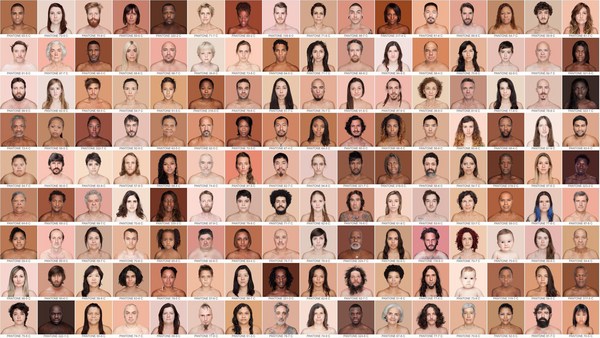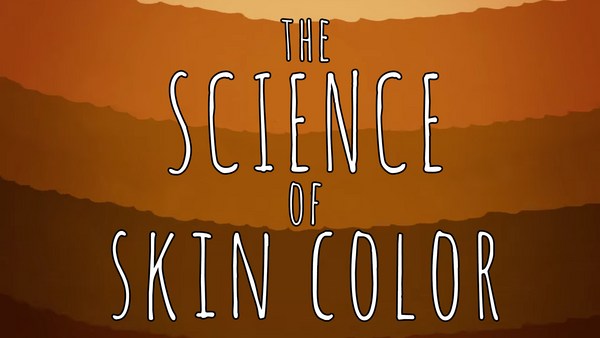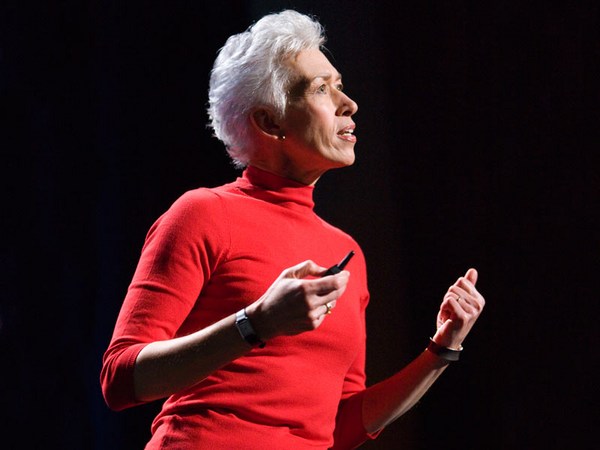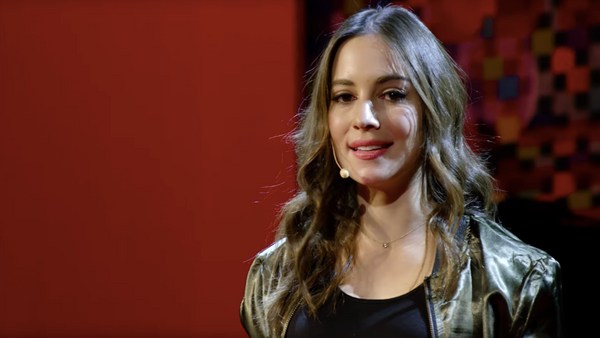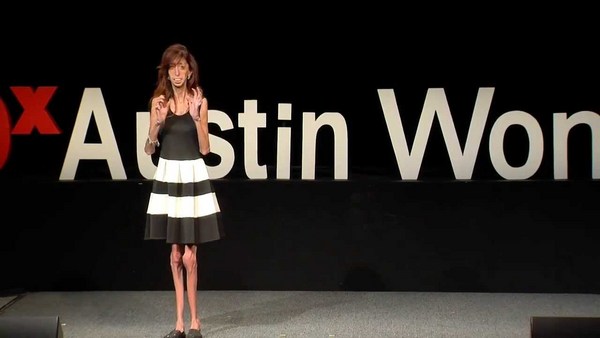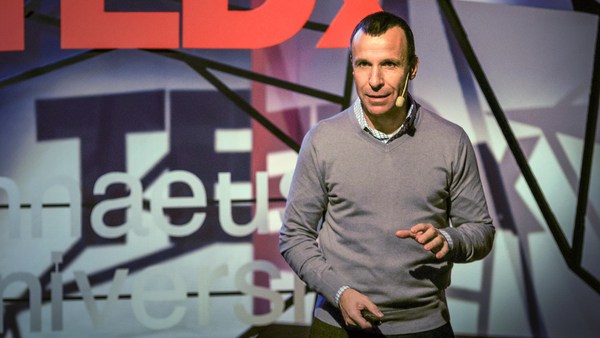When I was young, I wanted to be on TV: the lights, the cameras, the makeup, the glamorous life. And from my vantage point, just outside of a military base in Lawton, Oklahoma, I didn't make the distinction between TV reporter or actor. It was all the same to me. It was either, "Reporting live from Berlin" or "I shall attend her here and woo her with such spirit when she comes."
(Laughter)
It was all special, it was all the spotlight, and I just knew that it was for me. But somewhere along my journey, life happened.
Ah, much better.
(Applause)
I have a disease called vitiligo. It started early in my career. It's an autoimmune disorder. It's where it looks like your skin is getting white patches, but it's actually void of color. It affects all ethnicities, it affects all ages, all genders, it's not contagious, it's not life-threatening, but it is mental warfare. It's tough. Now, I was diagnosed with this disease when I was working on "Eyewitness News" in New York City. I was in the biggest city in the country, I was on their flagship station and I was on their top-rated 5pm newscast. And the doctor looked me right in the eye and said, "You have a disease called vitiligo. It's a skin disorder where you lose your pigment. There is no cure, but there a-la-la-la-la". Charlie Brown's teacher.
(Laughter)
He said there is no cure. All I heard was, "My career is over."
But I just couldn't give up. I couldn't quit, because we put too much into this. And by "we" I mean Mr. Moss, who sent me to speech and drama club instead of to detention, or my sister who paid part of my college expenses, or my mom, who simply gave me everything. I would not quit.
So I decided to just put on makeup and keep it moving. I had to wear makeup anyway. It's TV, baby, right? I just put on a little more makeup, and everything's cool. And that actually went very well for years. I went from being a reporter in New York City to being a morning show anchor in Detroit, the Motor City. And as the disease got worse, I just put on more makeup. It was easy. Except for my hands.
See, this disease is progressive and ever-changing. That means it comes and goes. At one point, for about a year and a half, my face was completely white. Yeah, it trips me out too.
(Laughter)
Yeah. And then, with a little help, some of the pigment came back, but living through this process was like two sides of a coin. When I'm at work and I'm wearing the makeup or wearing the makeup outside, I'm the TV guy. "Hey, how you doing everybody? Great." At home without the makeup, I'd take it off and it was like being a leper. The stares, constantly staring at me, the comments under their breath. Some people refused to shake my hand. Some people moved to the other side of the sidewalk, moved to the other side of the elevator. I felt like they were moving to the other side of life. It was tough, and those were some tough years. And honestly, sometimes I just had to shelter in place. You know what I mean? Kind of just stay at home till I get my mind right. But then I'd put my blinders back on, I'd get back out there, do my thing, but in the process of doing that, I developed this -- angry, grumpy demeanor. Anger is an easy go-to, and people would leave me alone, but it just wasn't me. It wasn't me. I was allowing this disease to turn me into this angry, grumpy, spotted guy. It just wasn't me.
So I had to change. I knew I could not change other people. People are going to react and do what they gonna do. But there was a cold hard reality as well. I was the one that was showing anger, sadness and isolating myself. It was actually a choice. I was walking out the door every day expecting the world to react with negativity, so I just gave them that mean face first. If I wanted change, the change had to start with me.
So I came up with a plan. Two-parter, not that deep.
Number one: I would just let people stare, drink it in, stare all you want, and not react. Because the truth is when I got this disease, I was all up in the mirror staring at every new spot trying to figure out what is going on. So I needed to let other people have that same opportunity to get that visual understanding.
Number two: I would react with positivity, and that was simply a smile, or, at the very least, a nonjudgmental, kind face.
Simple plan. But it turned out to be more difficult than I thought. But over time, things started to go OK. Like this one time, I'm at the store and this dude is like staring at me, like burning a hole in the side of my head. I'm shopping, he's staring at me, I'm going to the checkout, he's staring at me, I'm checking out, he's on the other line checking out, he's staring at me, we go to the exit, he's still staring at me, so I see he's staring and finally I turn to him and I go, "Hey buddy, what's up!" And he goes ...
(Mumbles nervously) "Hi!"
(Laughter)
Awkward.
So to relieve the tension, I say, "It's just a skin disorder. It's not contagious, it's not life-threatening, it just makes me look a little different." I end up talking to that guy for like five minutes. It was kind of cool, right? And at the end of our conversation, he says, "You know, if you didn't have 'vitilargo'" -- it's actually vitiligo, but he was trying, so --
(Laughter)
"if you didn't have vitilargo, you'd look just like that guy on TV."
(Laughter)
And I was like, "Haha, yeah, I get that, I get that, yeah."
(Laughter)
So things were going OK. I was having more good exchanges than bad, until that day. I had a little time before work so I like to stop by the park to watch the kids play. They're funny. So I got a little too close, this little girl wasn't paying attention, she's about two or three years old, she's running, she runs directly into my leg and falls down, pretty hard. I thought she hurt herself, so I reach out to try and help the little girl and she looks at my vitiligo and she screams!
Now kids are pure honesty. She's like two or three. This little girl, she wasn't trying to be mean. She didn't have any malice in her heart. This little girl was afraid. She was just afraid. I didn't know what to do. I just took a step back and put my hands by my side. I stayed in the house for two weeks and three days on that one. It took me a second to get my mind around the fact that I scare small children. And that was something that I could not smile away.
But I jumped back on my plan and just put on my blinders, started going back out.
Two months later, I'm in a grocery store reaching on the bottom shelf, and I hear a little voice go, "You've got a boo-boo?" It's like a two-year-old, three-year-old, same age, little girl, but she's not crying, so I kneel down in front of her and I don't speak two-year-old so I look up at the mom, and I say, "What did she say?" And she says, "She thinks you have a boo-boo." So I go, "No, I don't have a boo-boo, no, not at all." And the little girl says, "Duh-duh-hoy?" And so I look to mom for the translation, and she says, "She thinks you're hurt." And I say, "No, sweetie, I'm not hurt at all, I'm fine." And the little girl reaches out with that little hand and touches my face. She's trying to rub the chocolate into the vanilla or whatever she was doing. It was amazing! It was awesome. Because she thought she knew what it was, she was giving me everything I wanted: kindness, compassion. And with the touch of that little hand, she healed a grown man's pain. Yee-ha. Healed. I smiled for a long time on that one.
Positivity is something worth fighting for, and the fight is not with others -- it's internal. If you want to make positive changes in your life, you have to consistently be positive. My blood type is actually B positive.
(Laughter)
I know, corny TV guy dad joke, my daughter hates it, but I don't care! Be positive!
(Laughs)
A 14-year-old boy years ago -- this kid had vitiligo -- he asked me to show my face on television. I wasn't going to do it, we've been over this, I thought I was going to lose my job, but the kid convinced me by saying, "If you show people what you look like and explain this to them, maybe they will treat me differently."
Boom! Blinders off. I did a TV report, got an overwhelming response. So I didn't know what to do. I took the attention and focused it back on the kid and other people that have vitiligo. I started a support group. Pretty soon, we noticed "VITFriends" and "V-Strong" support groups all over the country. In 2016, we all came together and celebrated World Vitiligo Day. This past June 25, we had over 300 people, all in celebration of our annual event. It was amazing.
(Applause)
Thanks.
Now, I'm not going to lie to you and say it was quick or easy for me to find a positive place living with this disease, but I found it. But I also got much more. I became a better man, the man I always wanted to be, the kind of guy who can stand up in front of a room full of strangers and tell some of the toughest stories in his life and end it all with a smile, and find happiness in the fact that you all just smiled back.
Thank you.
(Applause)
